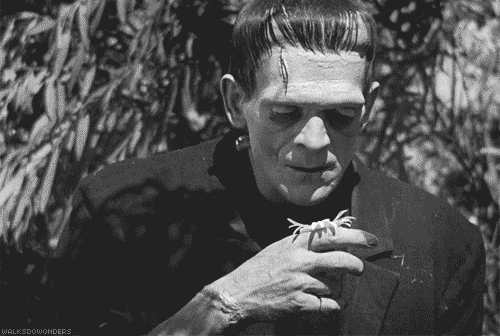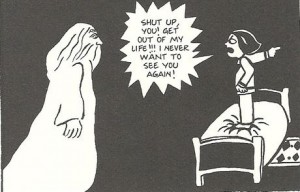What are the central conflicts in ‘The Raven’?
What are the central conflicts in ‘The Raven’? What types of conflict can you decipher?
Conflict is a vital idea used in literature, as it can quickly alter the mood of a text. Specifically, the main purpose of using conflict in writing is to create a strong sense of tension in the story, in order to leave the reader more interesting in what will occur next, while at the same time leaving them wondering and uncertain of the characters. In Edgar Allan Poe’s, “The Raven,” there is evidence of internal intellectual and emotional conflicts within the main character:
Intellectual
- As if someone gently rapping, rapping at my chamber door./ “Tis some visitor,” I muttered, “tapping at my chamber door- /Only this and nothing more.”
- “Tis some visitor entreating entrance at my chamber door-/ Some late visitor entreating entrance at my chamber door;-/ This it is and nothing more.”
- “Surely,” said I, “surely that is something at my window lattice;/ Let me see, then, what thereat is, and this mystery explores-/ Let my heart be still a moment and this mystery explores;-/ “Tis the wind and nothing more!”
- Bird or beast upon the sculptured bust above his chamber door,/ With such name as “Nevermore.”
- “Doubtless,” said I, “what it utters is its only stock and store/ Caught from some unhappy master whom unmerciful Disaster
At the beginning of the poem, the protagonist is reading books of lore in order to try and forget the loss of his lover Lenore. It is late into the night, and as he is nodding off, he hears a rapping at his chamber door. His first reaction is to rationalize, calm down, and understand what is happening, before telling himself that it is only a visitor. When you are home alone and someone knocks on your door, it is only normal for your mind to jump towards darker thoughts (such as there is a robber trying to break in or a monster waiting for you outside), however, after quickly thinking it over, we know better than to believe that such a thing would happen. When the tapping happens again, he nervously rationalizes that the person at his door is probably simply a late night visitor waiting for entry. When he opens his door and finds a dark hallway, his first thoughts are of a supernatural sort, as he thinks that it is his  dead lover, Lenore. When he decides to open the window to find the source of the noise and the raven flies in, he thinks that it is funny- and when the bird starts speaking the word ‘nevermore’, he believes that it had been trained to do so. In all of these scenarios, the main character is attempting to rationalize, fighting against his own dark thoughts to try and produce more reasonable ones. This shows the intellectual inner conflict that he was having, as he struggled to avoid thinking sinister thoughts and to normalize the situation he was in.
dead lover, Lenore. When he decides to open the window to find the source of the noise and the raven flies in, he thinks that it is funny- and when the bird starts speaking the word ‘nevermore’, he believes that it had been trained to do so. In all of these scenarios, the main character is attempting to rationalize, fighting against his own dark thoughts to try and produce more reasonable ones. This shows the intellectual inner conflict that he was having, as he struggled to avoid thinking sinister thoughts and to normalize the situation he was in.
Emotional
- “Wretch,” I cried, “thy God hath lent thee- by these angels he hath sent thee/ Respite- respite and nepenthe, from thy memories of Lenore;/ Quaff, oh quaff this kind nepenthe and forget this lost Lenore!”
- On this home by Horror haunted- tell me truly, I implore-/ is there balm in Gilead?- tell me- tell me, I implore!”
- It shall clasp a sainted maiden whom the angels name Lenore-/ Clasp a rare and radiant maiden whom the angels name Lenore.”
The poem relies heavily on an emotional response from the main character, especially in the last few stanzas. From the beginning, we are told that he is going through the stages of grief, as he lost his lover Lenore. As he tries to forget what happened, he is plagued by the raven who enters thro ugh his window and starts saying the word ‘nevermore’. He believes, at first, that the raven is a sort of omen to prove his misfortune, however, he quickly becomes more and more distressed. When he asks the raven if there is balm in Gilead, he is asking it if there is any way that he can relieve his pain and suffering, in order to forget all the emotions that he was feeling at the time. When the raven replies, ‘nevermore’, the main character calls him a ‘prophet’ and ‘a thing of evil’, so he can’t accept the idea that grief takes time to move on from. Finally, before his complete descent into madness, he asks the raven if in Heaven he will be able to hold Lenore again, but the raven replies, ‘Nevermore’. Throughout the entire poem, the main character is struggling internally as he tries to cope with the fact that his love died, however, at the same time, he is trying to believe that he might see her again. He can’t seem to understand the words of the raven and gets angrier as the poem goes on. It can be said that the raven is a representation of how he feels inside, and it is a physical embodiment of his emotions. Since the raven often says ‘Nevermore’ this could be the main character struggling with himself, thus showing the readers his inner emotional conflict, as he tries (and fails) to cope with the loss of his beloved Lenore.
ugh his window and starts saying the word ‘nevermore’. He believes, at first, that the raven is a sort of omen to prove his misfortune, however, he quickly becomes more and more distressed. When he asks the raven if there is balm in Gilead, he is asking it if there is any way that he can relieve his pain and suffering, in order to forget all the emotions that he was feeling at the time. When the raven replies, ‘nevermore’, the main character calls him a ‘prophet’ and ‘a thing of evil’, so he can’t accept the idea that grief takes time to move on from. Finally, before his complete descent into madness, he asks the raven if in Heaven he will be able to hold Lenore again, but the raven replies, ‘Nevermore’. Throughout the entire poem, the main character is struggling internally as he tries to cope with the fact that his love died, however, at the same time, he is trying to believe that he might see her again. He can’t seem to understand the words of the raven and gets angrier as the poem goes on. It can be said that the raven is a representation of how he feels inside, and it is a physical embodiment of his emotions. Since the raven often says ‘Nevermore’ this could be the main character struggling with himself, thus showing the readers his inner emotional conflict, as he tries (and fails) to cope with the loss of his beloved Lenore.

 Eilis is an Irish girl who has lived her whole life in a small village in Ireland. She gets a job offer working for Miss Kelly at her store, but only on Sundays, and for minimal pay.
Eilis is an Irish girl who has lived her whole life in a small village in Ireland. She gets a job offer working for Miss Kelly at her store, but only on Sundays, and for minimal pay.



